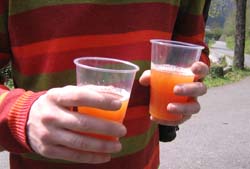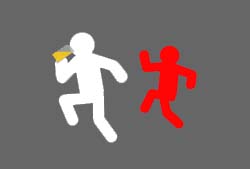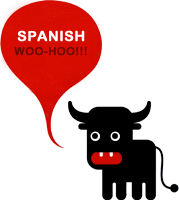Dictionary of Spanish Slang
Slang Dictionary
Here are a few examples of some of the most widely used Spanish slang words and phrases within Spain today:
Aguafiestas – translated literally as ‘party-pooper’ in English, aguafiestas literally means water party, as in someone who has thrown water over what was a great celebration. Usually used in the context of people who refuse to take part in an event or, even if they do so, put a downer on the whole thing.

Botellón – one of the most important words amongst young people in Spain, a botellón is a popular gathering of young people from the area, numbers of participants are usually in the hundreds, who come together in an open area of public space to drink and chat together.
Buenas – a shortened term for greetings such as buenos días, buenas tardes etc. which is used a lot among friends and strangers alike.
Coger el toro por los cuernos – literally translated as ‘taking the bull by the horns’, the phrase is quite widely used within Spanish society to mean throwing yourself into something, taking initiative.
De puta madre* – although its literal meaning is quite vulgar, this phrase is in fact used in a positive manner in Spain where it usually means that something is really great, exceeding expectations or ‘totally awesome!’.
Enchufe – literally meaning ‘plug’ in Spanish, many now use this word to mean a connection or contact that one can use to get somewhere or excel in some way and is commonly used in reference to business networking.
En serio – a phrase that you will no doubt hear many times during your stay in Spain, ¿en serio? can be translated as ‘are you serious?’ or ‘really?’
Faltarle un tornillo – the literal translation of ‘to have a screw loose’
Finde – a shortened word for ‘fin de semana’ meaning weekend in Spanish.
Flipar – ‘tu flipas’ means ‘you’re joking’
Guay – probably the most un-guessable phrase in contemporary Spanish is ¡Que guay! to mean ‘That’s so cool!”
Guiri – a term used to describe a foreigner living in Spain. Be careful though, this can either be used in a friendly or insulting way!
Hacer un papelón – used throughout Spain meaning ‘to make a fool of yourself’. ‘¡Que papelón!’ is also used to express the phrase ‘How embarrassing!’

Hacer un simpa o sinpa – basically ‘to do a runner’ from a restaurant, bar or café without paying, apparently quite a common occurrence here in Spain!
Hombre – although one of the most recognised words in the Spanish language, it is used very commonly in everyday Spanish to mean ‘dude’ or something along those lines to add emphasis or draw attention to a detail of speech.
Ligar – This well-used verb can have a number of meanings. Firstly it is used to suggest a get-together or meeting between friends usually for a few drinks and a catch-up. The verb can also be used to mean ‘to make-out’ or ‘hook up’.
Mono – used as an adjective to mean ‘cute’ or ‘pretty’, be careful though, used as a noun the same word means ‘monkey’!
Nene / nena – literally referring to ‘little boy/girl’ these terms have passed into contemporary Spanish slang to mean ‘dude’ or ‘chick’.
Pasar de – to care less (about someone or something)
Puente – literally meaning ‘bridge’ in Spanish, this word is also used to refer to the occurrence when a public holiday falls on a weekday allowing a long weekend.
Tener mala leche – to be bad-tempered, nasty
Tío / tía – although meaning uncle/aunt, these titles are also used amongst close friends to address each other.









